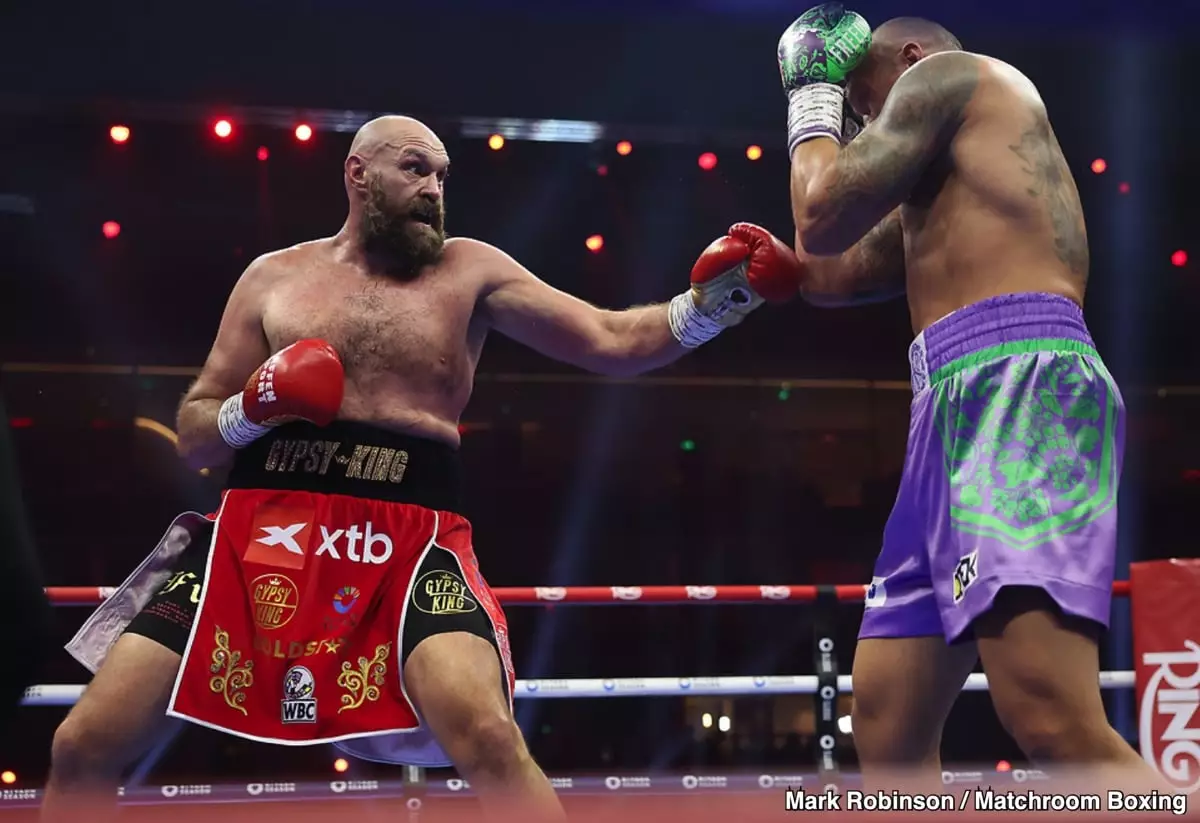The recent rematch between Tyson Fury and Oleksandr Usyk has sparked considerable debate among boxing fans and experts alike, with differing opinions regarding the fight’s outcome. Promoter Eddie Hearn has controversially stated his belief that the match was a draw, despite Usyk walking away with a unanimous decision victory. This article delves into the intricacies of the fight, the differing perspectives, and what it means for both fighters moving forward.
The bout, which took place at the Kingdom Arena in Riyadh, concluded with Usyk being declared the winner by a unanimous decision, with all three judges scoring it 116-112 in his favor. However, Hearn’s assertion that he scored it a draw raises eyebrows, given the performance put forth by both fighters. Fury, whose record now stands at 34-2-1, failed to produce the expected aggression and prowess, instead appearing out of shape and struggling to implement his game strategy effectively. Usyk, on the other hand, showcased his boxing acumen, effectively controlling the bout’s tempo and landing crucial shots, particularly in the latter rounds.
Critics and commentators have pointed out that Fury’s physical condition played a significant role in the fight’s dynamics. Despite his towering stature, Fury came into the ring with a visible “paunch,” his heavy-set appearance raising questions about his preparation. The Gypsy King’s inability to deliver his signature power punches, such as the right uppercut, left fans perplexed as to whether he had trained optimally for this significant match-up. Even renowned boxing commentator Sergio Mora remarked on Fury’s lack of body shots, asserting that he should have utilized his size and power to his advantage by engaging more effectively as a heavyweight fighter.
Hearn’s claim aligns with the echoes of sentiment from other spectators present ringside, including Fury’s promoters Frank Warren and Bob Arum, who reportedly preferred Fury’s performance. However, the question arises: are these opinions shaped by a bias in favor of Fury, given his status as a reigning champion prior to the fight? Such contradictions highlight the ongoing issue of subjectivity in boxing, where a fight’s pace, style, and outcome can often be interpreted in various ways, depending on the viewer.
While it’s understandable that some may view the fight as competitive, the data suggests otherwise. Fury’s own reluctance to adhere to his trainer SugarHill Steward’s instructions was a crucial factor that compromised his effectiveness. Steward’s repeated advice to not let Usyk back him up seemed to fall on deaf ears, as Fury consistently retreated under pressure. This misstep allowed Usyk to take control, negating Fury’s potential for victory. The fight appeared less about sheer physicality and more about strategic execution, with Fury ultimately falling short.
Usyk’s performance was nothing short of commendable. Boasting an impressive record of 23 wins (12 by knockout) and no losses, he dominated the latter stages of the fight, controlling the center of the ring and landing effective combinations to the head and body. His ability to adapt and respond to Fury’s sporadic threats was indicative of a highly skilled boxer who has once again positioned himself at the pinnacle of heavyweight boxing.
Looking forward, Usyk’s victory raises intriguing questions about future matchups within the heavyweight division. Would a third fight against Fury offer a different narrative, or will Usyk now turn his attention to other contenders? The boxing world is undoubtedly eager to see how this victory will shape Usyk’s career trajectory and whether he can unify titles against other champions in the division.
The Fury vs. Usyk rematch served as a poignant reminder of the complexities inherent in boxing judging and analysis. While Hearn’s opinion illustrates a desire for a different narrative, the fight’s outcome should reflect the skill and execution demonstrated in the ring. Boxing requires not just strength but strategic engagement, and in this instance, Usyk’s performance proved superior.
Fury, however, must take stock of his training regimen and approach if he hopes to reclaim his position as a dominant force in the heavyweight division. In a sport characterized by its unpredictability, this rematch has ignited fervor for future battles and highlighted the importance of conditioning and tactical discipline in achieving success. The path ahead promises intrigue as fans remain eager to see how both fighters will evolve in their respective journeys.


Leave a Reply